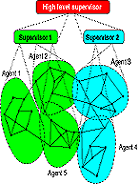| |
Huge traffic congestion after recent incidents (such as the bomb alerts in the tunnels in Amsterdam, or at the IKEA stores), or the problems in The Netherlands and California due to power outages have shown the crucial role of a reliable operation of traffic and transportation systems, electricity distribution networks, and other large-scale complex systems that are one of the corner-stones of our modern society such as water distribution,
logistic operations, and telecommunication networks. A reliable and efficient operation of these systems is not only of paramount importance when the systems are pressed to the limits of their performance, but also under regular operating conditions.
The systems mentioned above can be modeled as hybrid systems, i.e., systems with both continuous and discrete dynamics. Up to now, most control methods for hybrid systems are based on a centralized control paradigm and/or on ad-hoc techniques. However, centralized control of large-scale systems is often not feasible in practice due to computational complexity, communication overhead, and lack of scalability. Furthermore, a structured control design method is also lacking. Therefore, we propose to develop a structured and tractable
design methodology for robust control of large-scale hybrid systems.

Figure 1: A schematic representation of a hierarchical multi-agent
control framework.
We will develop both the necessary new theory and a corresponding design framework for control of largescale hybrid systems using an approach based on:
- a multi-level control structure with local control agents at the lowest level, and one or more higher supervisory control levels,
- combination and integration of techniques from computer science and control engineering in order to obtain coordination at and across all control levels.
This will result in systematic approaches that outperform existing heuristic or case-dependent decentralized control strategies.
In addition to performing fundamental research on control of large-scale hybrid systems, we will concentrate on three specific application fields: traffic & transportation, electricity distribution, and logistics.
|
